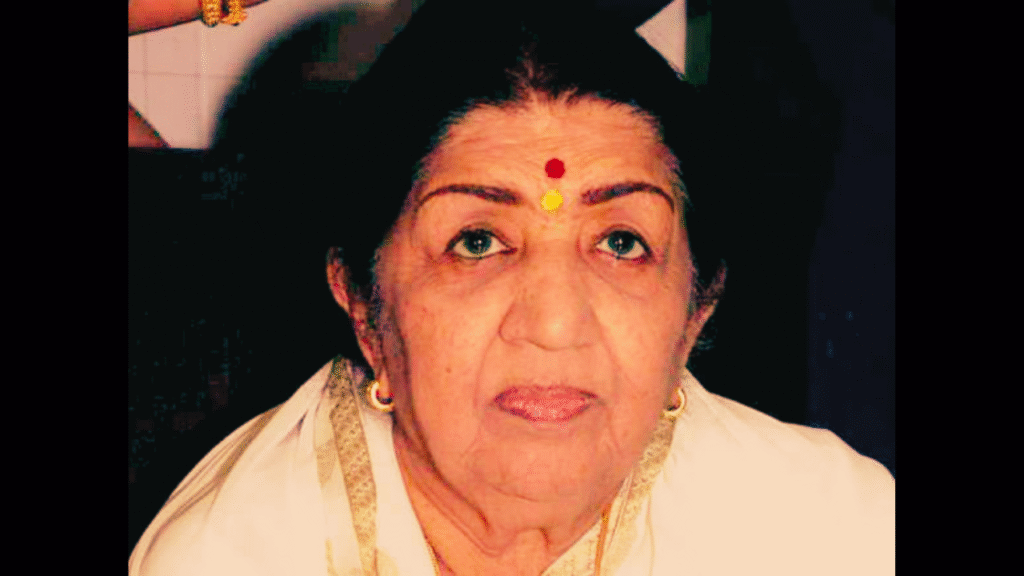Lata Mangeshkar: The Eternal Voice of India

Lata Mangeshkar (28 September 1929 – 6 February 2022) was more than just a playback singer; she was an emotion for millions of music lovers across generations. Revered as the Nightingale of India, her melodious voice became the soundtrack of Indian cinema for over seven decades. From soulful ghazals to patriotic anthems and romantic ballads, Lata ji’s singing defined the golden era of Bollywood music.
Early Life and Musical Roots
Lata Mangeshkar was born in Indore, Madhya Pradesh, into a family deeply rooted in music. Her father, Pandit Deenanath Mangeshkar, was a classical singer and theatre actor, and it was under his guidance that she took her first steps into music. She was the eldest among five siblings — Meena Khadikar, Asha Bhosle, Usha Mangeshkar, and Hridaynath Mangeshkar — all of whom became accomplished musicians in their own right.
At the tender age of 13, following her father’s untimely death, Lata took on the responsibility of supporting her family through singing and acting in films.
Journey in Playback Singing
Lata Mangeshkar’s breakthrough came in the late 1940s, with songs like “Aayega Aanewala” from Mahal (1949), which instantly established her as a rising star in playback singing. Her ability to adapt to different genres, emotions, and styles made her the most sought-after voice in the film industry.
Over the years, she worked with legendary music directors such as:
Madan Mohan – famous for soulful ghazals.
S.D. Burman & R.D. Burman – masters of melody.
Shankar–Jaikishan – creators of grand musical scores.
A.R. Rahman – with whom she collaborated in the later part of her career.
Iconic Songs
Her repertoire includes thousands of songs in multiple languages, but some timeless classics include:
Lag Ja Gale (Woh Kaun Thi?, 1964)
Pyar Kiya To Darna Kya (Mughal-e-Azam, 1960)
Ajeeb Dastan Hai Yeh (Dil Apna Aur Preet Parai, 1960)
Tere Bina Zindagi Se (Aandhi, 1975)
Ae Mere Watan Ke Logon (1963) – a patriotic masterpiece that moved even Prime Minister Jawaharlal Nehru to tears.
Awards and Honours
Lata Mangeshkar’s contribution to Indian music earned her unparalleled recognition:
Bharat Ratna (2001) – India’s highest civilian honour.
Padma Vibhushan (1999) and Padma Bhushan (1969).
Dadasaheb Phalke Award (1989).
Multiple National Film Awards and Filmfare Awards.
International accolades including recognition from France and UNESCO.
Beyond Cinema
Apart from playback singing, Lata ji composed music under the pseudonym Anand Ghan. She also produced films and took an active interest in nurturing new talent. Despite her fame, she remained humble, attributing her success to her dedication to music and blessings from her audience.
Later Years and Legacy
Even in her later years, Lata Mangeshkar continued to record songs, her voice retaining its signature purity. Her final recorded song for a film was Jeena Hai Kya in 2019, showing her lifelong commitment to music.
Her passing on 6 February 2022 marked the end of an era in Indian music. However, her songs continue to resonate, ensuring her voice remains immortal in the hearts of millions.
Lata Mangeshkar was not just a singer but a cultural icon whose voice symbolized the emotions of India for more than seven decades. Her dedication, discipline, and divine talent have set a benchmark in the world of music that is nearly impossible to match. To this day, she remains an inspiration for aspiring artists and a beloved figure for music lovers worldwide.
